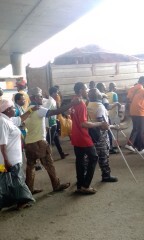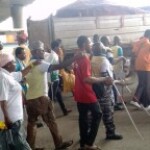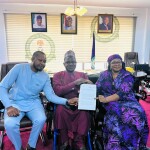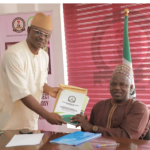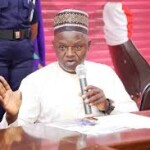The Nigeria Association of the Blind, Lagos, has urged the state’s Special Task Force on the Environment, Lagos State Traffic Management Authority, KAI and others to make access and safe movement for the blind a topmost priority in their operations.
"It is part of the intentional social protection initiatives we desire in Lagos,” said NAB chairman Lukman Salami in a press statement for the White Cane Day Celebration on October 15.
“Transportation and safe mobility are such a big deal for blind and vision-impaired persons anywhere in the world,” Salami said.
The state’s Special People’s Law and the federal Discrimination Act 2018 provide that public transport system should be made accessible for the blind and other persons with disabilities.
While there has been minimal compliance by both governments in building mostly ramps, citizens, particularly people with no disabilities, have showed they care little about accessibility and safe movement for the blind.
“All of these are happening because of the pervasive stereotyped thinking of the society and the ineptitude of LASODA to effectively translate the vision of the government for Lagosians with disabilities,” Gbenga Ogundare, NAB’s spokesman, said in the statement.
Lagos has lately been clearing the walkways, ramps, and roads of hawkers and traders whose activities expose the PWDs to greater risk of compound disabilities.
Clarifying how the cane serves the blind even in the most accessible civilization, Salami admitted the problem of accessibility in Nigeria.
“But imagine what the situation would have looked like if there had been no adoption of the white cane,” the chairman told ER.
The 2023 celebration, themed “Safeguarding the Movement of the Blind,” aligns with the on-going traffic clearing efforts, and the association’s leadership wants the state to sustain it.
“Keeping the roads and walkways as well as pedestrian bridges accessible and secured for our members is a non-negotiable demand,” he said.
From its origin in the 1930s in the West, the white cane became a symbol that granted the bearer recognition and preference by other road users when free movement becomes difficult for the visually impaired.
Nigeria is one of the countries that adopted the assistive device, and enacted a disability law, but (unlike the US and other countries) fails to make laws empowering the cane. Ditto for Lagos.
"It has always been, and remains a difficult experience for blind and vision-impaired persons who struggle to live and secure their livelihoods in a state that boasts the first disability law in Nigeria,' Ogundare said.
So far, neither the Discrimination Act nor the Lagos Special People Law grants the cane the force it needs to compel Nigerians, and specifically Lagosians, to, as a matter of social responsibility, recognize the rights of the bearer to safe and independent movement.
To emphasise the cane’s importance, Aanuoluwa Yinka, a leader of the association at the LGA level, takes it as his own symbol of identity.
“When people see the cane, they are willing to help me navigate a difficult terrain, even though it embarrasses them to be seen with someone holding a white cane,” he told ER after the charity road walk from Bolade, Oshodi, to the Digital Bridge Institute, Cappa, Mushin Rd.
In addition to the road walk, the celebration also featured speeches and discussions on confidence building and exceptional performance even when the few employers of the few blind people in private or government workplaces do not expect PWDs to be of much use.
Members also received white canes Zenith Bank donated, in addition to the N1.5 million it provided to cover other logistics. Other sponsors, include the Synagogue, and the RCCG donated cash while the Bible Society of Nigeria and other volunteers contributed in kind.

